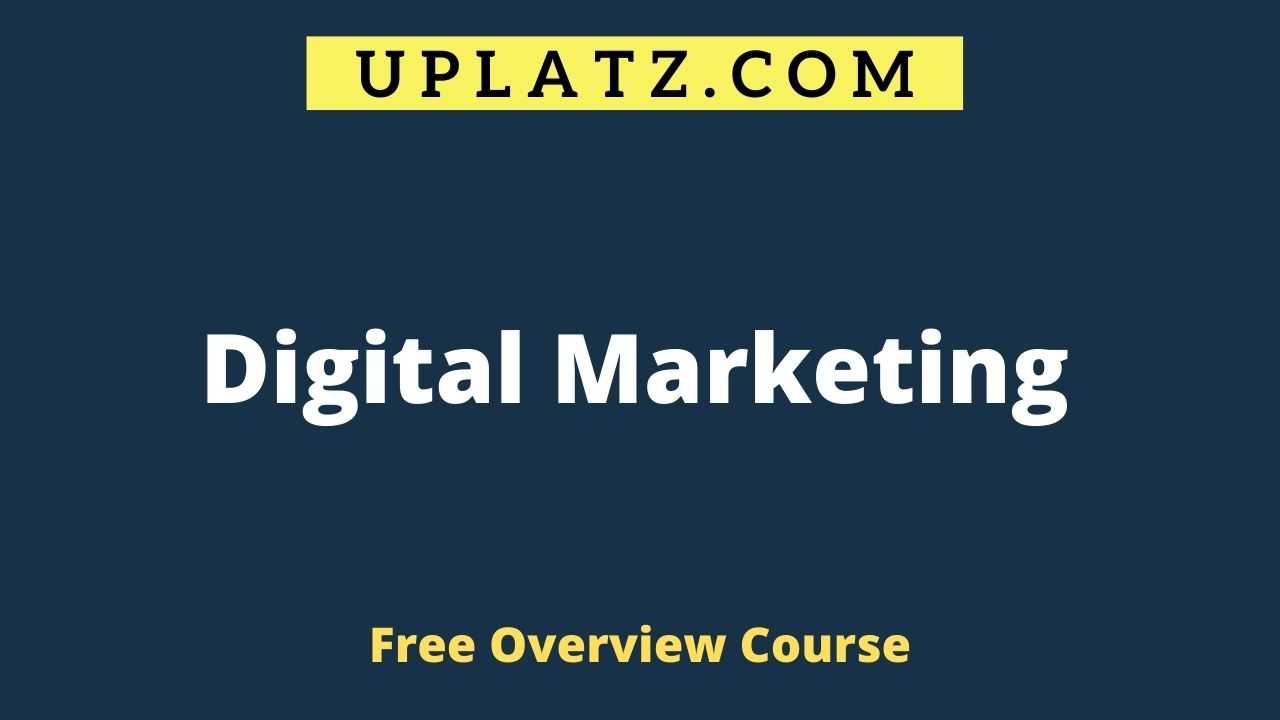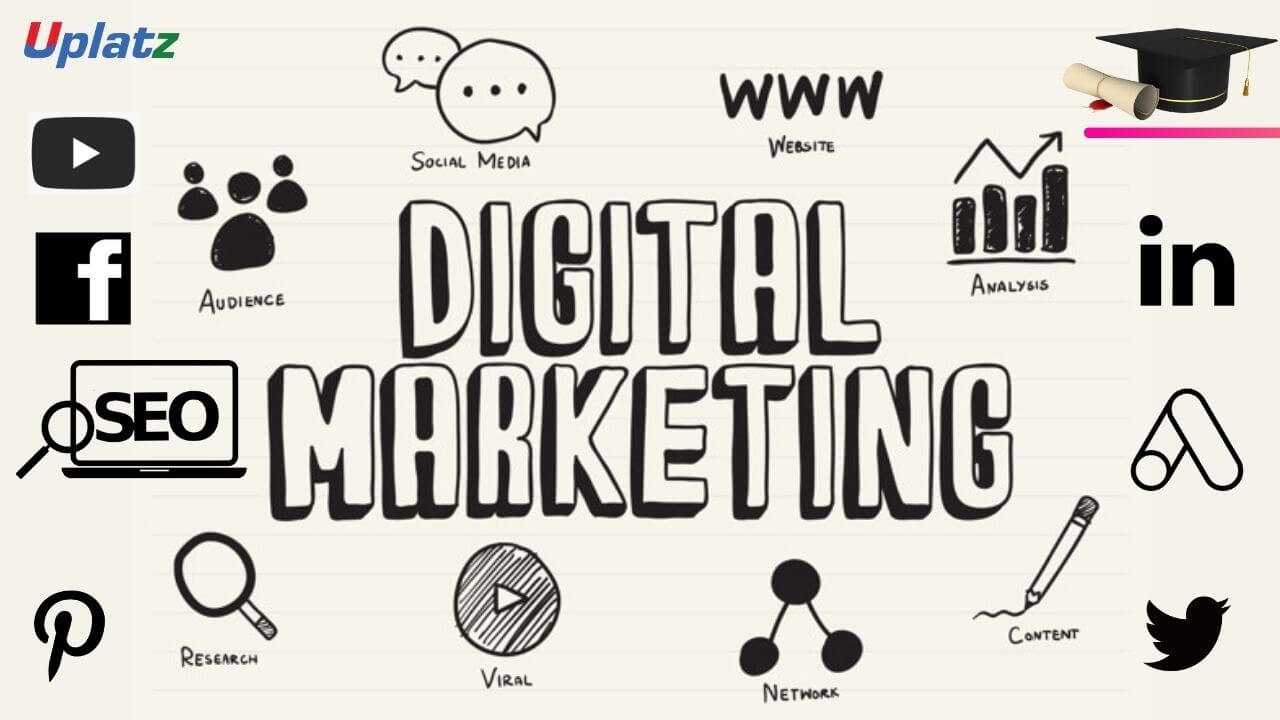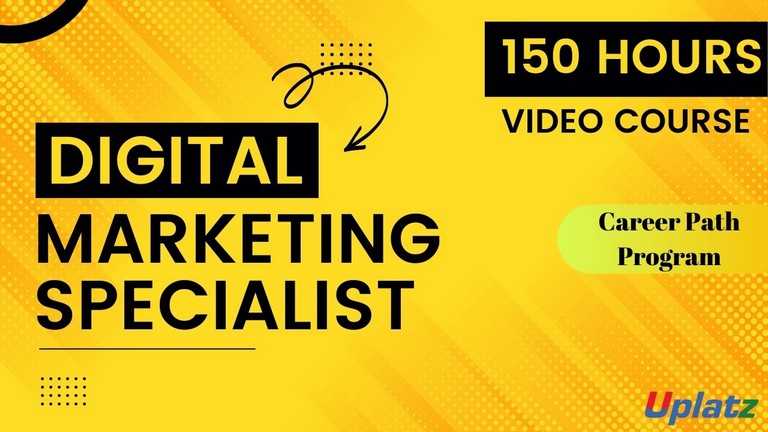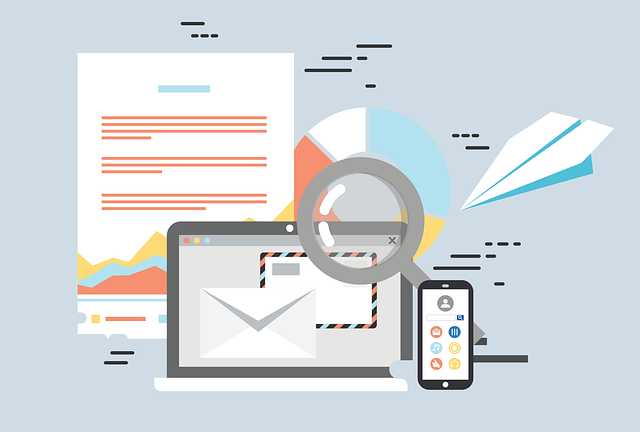Overview Course - Digital Marketing
Mastering the art of online growth: A comprehensive guide to Digital Marketing strategies and techniques. Become a Digital Marketing and SEO expert. View Course Curriculum
Price Match Guarantee
Full Lifetime Access
Access on any Device
Technical Support
Secure Checkout
Course Completion Certificate
View Course Curriculum
Price Match Guarantee
Full Lifetime Access
Access on any Device
Technical Support
Secure Checkout
Course Completion Certificate
 54% Started a new career
Enroll Now
54% Started a new career
Enroll Now
-
 30% Got a pay increase and promotion
30% Got a pay increase and promotion
Students also bought -
-

- Professional Diploma in Digital Marketing
- 50 Hours
- GBP 132
- 2378 Learners
-

- Career Path - Digital Marketing Specialist
- 150 Hours
- GBP 32
- 1680 Learners
-

- Email Marketing
- 10 Hours
- GBP 12
- 224 Learners

This is an overview course on Digital Marketing while the complete detailed-level Digital Marketing course is available at - https://training.uplatz.com/online-it-course.php?id=digital-marketing--seo-40.
Digital Marketing, in simple terms, is the marketing of any product through the use of Digital Medium. Though this term looks somewhat less complex, but, Digital Marketing by its own consists of many components which makes it one of the most challenging yet an interesting course for many marketers or learners who want to make his career as a successful Digital Marketer.
Some of the major components of Digital Marketing include (i) Search Engine Optimization (SEO) (ii) Pay-per-click advertising (PPC) (III) Content Marketing (iv) Social Media Marketing (v) Email Marketing and many more. Though the concept of Digital Marketing is similar to the traditional ways of marketing, but compared to it, it is much more cost-effective and flexible as compared to its counterpart.
Whether you are a student who wants to make your career in the field of Digital Marketing or a budding marketer who want to upgrade your skills or even a business owner, trying to rank your website in the SERP, this course from Uplatz will help you in fulfilling your demand. With this course, you will get an overview on the complete Digital Marketing, starting from the scratch of traditional marketing ways, website planning and development in WordPress, advanced SEO, Lead generation for Businesses, Social Media Marketing, Google Ads, Tools like AdSense and many more.
At the end of this course, students will be awarded a Course Completion Certificate from Uplatz.
Course/Topic - Digital Marketing overview - all lectures
-
1-What is Digital Marketing
-
2-Primary Search Engine and their Philosophy
-
In this lecture session we learn about A system for disseminating information over the Internet to a selected group of followers. Social media platforms are used by people to publish their daily activities, comments and photos as well as re-publish information posted by others. The two major social media platforms are Facebook and Twitter.
-
4-Digital Marketing Terminology
The objective of this Digital Marketing course is to provide learners with a thorough understanding of the strategies and tools essential for driving effective online marketing campaigns. Participants will gain hands-on experience with key digital marketing techniques, including search engine optimization (SEO), pay-per-click (PPC) advertising, social media marketing, content creation, and data analytics. By the end of the course, learners will be adept at creating and executing comprehensive digital marketing plans, analyzing performance metrics, and optimizing strategies to achieve business goals and enhance online presence.
Fundamental Objectives:
- Understanding Digital Marketing Concepts: Grasping the fundamental concepts of digital marketing, including its various channels, strategies, and tactics. This involves understanding how digital marketing differs from traditional marketing and the unique advantages it offers.
- Developing a Digital Marketing Strategy: Learning how to create a comprehensive digital marketing strategy that aligns with business goals and target audience. This includes defining objectives, identifying target markets, selecting appropriate channels, and setting key performance indicators (KPIs).
- Mastering Digital Marketing Channels: Gaining expertise in various digital marketing channels, such as search engine optimization (SEO), pay-per-click advertising (PPC), social media marketing, content marketing, email marketing, and mobile marketing.
-
Content Creation and Optimization: Understanding how to create engaging and relevant content for different digital platforms and optimizing it for maximum reach and impact.
- Data Analysis and Measurement: Learning how to use analytics tools to track the performance of digital marketing campaigns, measure ROI, and make data-driven decisions to improve results.
Additional Objectives:
- Technical Skills: Acquiring technical skills in areas such as website development, search engine marketing (SEM), social media advertising, email automation, and content management systems (CMS).
- Advanced Strategies: Exploring advanced digital marketing strategies, such as influencer marketing, affiliate marketing, video marketing, and programmatic advertising.
- Emerging Trends: Staying up-to-date with the latest trends and technologies in the digital marketing landscape, such as artificial intelligence (AI), virtual reality (VR), and augmented reality (AR).
- Specialized Skills: Developing specialized skills in specific areas of digital marketing, such as e-commerce marketing, B2B marketing, or social media marketing for specific platforms.
Overall Goals:
- Empowering Marketers: Providing marketers with the knowledge and skills needed to plan, execute, and measure effective digital marketing campaigns.
- Driving Business Results: Equipping marketers with the tools to drive traffic, generate leads, increase sales, and achieve measurable business results through digital channels.
- Staying Ahead of the Curve: Ensuring marketers are prepared to adapt to the constantly evolving digital landscape and leverage new technologies and trends to their advantage.
1. Digital Marketing Overview
• Marketing, Traditional vs Digital
• Inbound/Outbound Marketing
Website Planning & Development- WordPress
• Domain Selection
• Website Hosting
• Website Planning and Design
• Bloggings
• Design for Marketing
2. Advanced Search Engine Optimization
• On-Page Optimization
• Off-Page Optimization
• Local SEO/GMB
• International SEO
• Black HAT SEO
• Content Marketing
• Google Analytics
• Google Tag Manager
• SEO Strategy, Auditing and Reporting
3. Lead Generation for Businesses
• Email Marketing
• Email Automation
• Lead Generation for Businesses
• Mobile Web Marketing
• App Store Optimization
• SMS Marketing
4. Social Media Marketing
• Facebook Optimization & Marketing
• LinkedIn Optimization & Marketing
• Twitter Optimization & Marketing
• Instagram Optimization & Marketing
• YouTube Optimization & Marketing
• Pinterest Optimization & Marketing
• Quora Optimization & Marketing
5. Ecommerce Marketing
• E-Commerce Optimization & Marketing
• Dropshipping
• Marketplaces for Product Selling
6.Online Display Advertisements
• Google Ads Introduction
• Google Search Ads/PPC
• Google Display Ads/GDN
• Google Video Ads
• E-commerce Ads
• Remarketing
• Retargeting
• Universal App Campaign
• Conversion Tracking
7. Money Making Tool
• Affiliate Marketing
• Google AdSense
• Start as a Freelancer
8. Digital Marketing Strategies
• Online Reputation Management ORM
• Growth Hacking Fundamentals
• Influencer/Attraction Marketing
• Mock Interviews
The Digital Marketing Certification ensures you know planning, production and measurement techniques needed to stand out from the competition.
Digital marketing, also called online marketing, is the promotion of brands to connect with potential customers using the internet and other forms of digital communication. This includes not only email, social media, and web-based advertising, but also text and multimedia messages as a marketing channel.
Digital marketing involves the promotion of products and services through a variety of digital channels, using the internet and mobile technology. Push and pull marketing techniques are applied, targeting consumers both directly and indirectly.
Digital marketing can be broadly broken into 8 main categories including: Search Engine Optimization, Pay-per-Click, Social Media Marketing, Content Marketing, Email Marketing, Mobile Marketing, Marketing Analytics and Affiliate Marketing.
The digital marketing sector requires experts who are holding digital marketing certificates and up to date with the latest developments and trends. Here is why: Digital marketing is an ever-changing field with talented and inspiring experts who allow businesses to stay at the top of the competition.
Digital marketing, in all forms, comes with a variety of stresses. It's an amazing career and industry to be a part of, but it wouldn't be a career if it didn't stress people out here and there.
A digital marketer can take up multiple roles and use various digital channels such as digital advertising, social media, email marketing, blog content, etc., to reach out to the customers. For each digital channel, a digital marketer focuses on a unique objective to measure the company's performance across channels.
Uplatz online training guarantees the participants to successfully go through the Digital Marketing Certification provided by Uplatz. Uplatz provides appropriate teaching and expertise training to equip the participants for implementing the learnt concepts in an organization.
Course Completion Certificate will be awarded by Uplatz upon successful completion of the Digital Marketing online course.
The Digital Marketing draws an average salary of $125,000 per year depending on their knowledge and hands-on experience.
Digital marketing specialists are most in-demand, while the media coordinator role is experiencing the fastest growth.” Indeed, LinkedIn says that half of the top 10 jobs posted on LinkedIn are in the digital or media space.
Digital marketing is still a comparatively young profession. The business, according to Linkedin, is increasing every year, pays a decent salary, and has the most job vacancies.
Note that salaries are generally higher at large companies rather than small ones. Your salary will also differ based on the market you work in.
Digital Marketing Specialist.
Digital Marketing Executive.
SEO/Digital marketing Executive.
Q1. How can you categorize Digital marketing?
|
Inbound Marketing |
Outbound Marketing |
|
Pulls in interested costumers |
Pushes regardless of interest |
|
Written according to the consumer’s needs |
Written according to the product’s needs |
|
A part of content consumption |
Disrupts content consumption |
|
Natural habitat: blogs, social media, search, influencer marketing, opt-in emails. |
Natural habitat: display ads, telemarketer scripts, magazines, TV ads, billboards. |
Q2. Explain Digital marketing?
Ans: Digital marketing is all about the tactics for brand marketing via online channels. It includes various techniques like SEO, SEM, Link building, Email marketing, PPC, Affiliate Marketing, etc.
Q3. What are the different types of Digital Marketing?
Ans: Different Digital Marketing aspects –
- Search Engine Optimization (SEO)
- Search Engine Marketing (SEM)
- Content Marketing
- Email Marketing
- Social Media Marketing
- E-commerce Marketing
Q4. What are the most effective ways to increase traffic to your website?
Ans: The most popular and effective ways to increase traffic to your website are-
- Paid search
- Display advertising
- Content marketing
- Writing crisp headlines
- SEO activities
- Content optimization
- Targeting long-tail keywords
- Guest blogging
- Seeking referral traffic
- Posting content on LinkedIn
- Linking Internally
- Email marketing
Q5. Define SEO.
Ans: SEO or Search Engine Optimization is the process of increasing the quantity and quality of website traffic by increasing the visibility to users of a web search engine. SEO is the practice of getting traffic from the organic, editorial or natural search results on search engines.
Q6. Explain keywords in Digital marketing? How important is it for SEO?
Ans: A keyword is the most significant and fundamental element of Search Engine Optimization. Users use keywords to search for a product or service on the internet.
Keywords are the core of all your SEO efforts. They are crucial for better rankings in the search engine result pages (SERPs). It is really important to make your website SEO optimized for keywords that are relevant to your business. This would help your website’s pages to rank higher in search engines which makes it easier for people to find your website.
Q7. What are the key areas where you can use keywords to optimize your site ranking?
Ans: For better page ranking, keywords can be used in the following areas-
- Website URL
- Website Title
- Meta tag
- Web page content
- Body text
- Headlines
Q8. What are the different types of SEO?
Ans: White hat SEO – It is the most popular SEO technique that utilizes methods and techniques to improve search engine rankings of a site which do not run afoul of search engine guidelines. White hat SEO uses techniques like high-quality content, link acquisition, website HTML optimization, and restructuring. With White hat SEO, you can expect a long-lasting growth in your rankings.
Black hat SEO – It exploits the various weaknesses in the search engines algorithms to get high rankings. The Black hat SEO is not in accordance with the SEO guidelines set by search engines. Some of the black hat SEO techniques are keyword stuffing, link spam, hidden text, hidden link. Using these techniques, you can expect unpredictable, quick but short-lasting growth in rankings.
Grey hat SEO – Grey hat SEO is neither black nor white, it rather combines both. It is a transformation from black SEO techniques to white SEO techniques and from white SEO techniques to black SEO techniques.
Q9. What are on-page and off-page optimization?
Ans:
|
On-page |
Off-page |
|
It refers to factors that you can optimize on your own website to grow traffic. |
Of-page SEO is all about your online reputation. It includes acquiring backlinks for your page from the authority sites in your niche. |
|
The main components involved in on-page optimization are – Title of the page, Meta description tag, Optimized Image with alt tags, URL structure, High-quality content, Optimized internal links. |
The main components involved in off-page optimization are – Acquiring Backlinks, Leveraging social interaction with your site, Promote your content via social channels, Add social book markings, Guest Blogging |
Q10. Name some useful Digital Marketing tools.
Ans:
- Keyword Discovery
- RankWatch
- Moz
- Alexa Ranking
- Google Analytics
- Crazy Egg Heatmaps
- Favicon Generator
- XML Sitemap Generator
- SubmitExpress Link Popularity
- Digital Point Keyword Tracker
- Google Trends
- Google Keyword Planner
- Kissmetrics
- SEMrush
- Ahrefs
- Buzzsumo
- AdExpresso
- Buffer App
- MailChimp
- Unbounce
- Hasoffers









